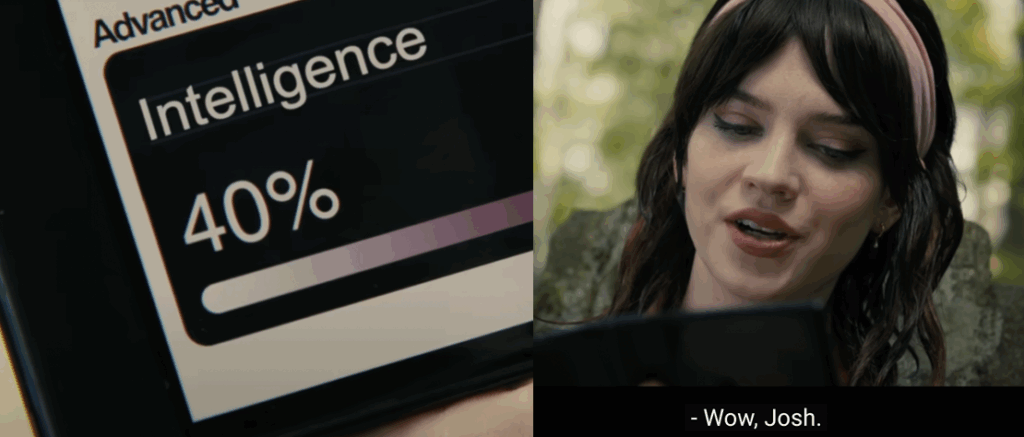*Spoiler warning for films Companion (2025) and The Stepford Wives (1975) & (2004)*
As a long-time fan and follower of the thriller genre, I was curious as to whether director Drew Hancock’s Companion (2025) would breathe new life into the familiar “AI gone wrong” narrative. We’ve seen this trope over and over again, so what could be different about Companion? At first glance, it looks like yet another sleek sci-fi thriller in the vein of M3gan (2022) and I, Robot (2004), further perpetuating our horror in AI machines and what they will do to us. After watching this film, however, it becomes clear that the real horror lies not in the AI itself, but in the humans who design and exploit it.

Josh and Iris at the Dinner Table. Image: Moviescramble
Companion follows Iris (Sophie Thatcher) and her boyfriend Josh (Jack Quaid) on their weekend getaway to a remote lakeside cabin with Josh’s friends. The retreat takes a dark and twisted turn when we discover that Iris is not human, but instead a companion robot designed to serve Josh and his friends’ plans, like a pawn in their chess game. What makes this thriller truly disturbing however, is Josh himself. On the surface he appears charming, but as the film progresses, his manipulation of Iris and complete abuse of her becomes chillingly apparent. He even mocks her by calling her “beepboop”, a nickname that reduces her very existence to a joke.
Hancock isn’t the first to explore this theme of using robots to satisfy human desire; he echoes earlier works such as The Stepford Wives (1975) and its 2004 remake. The men of Stepford replace their wives with robotic replicas, stripping them of their autonomy, and reshaping them into submissive, patriarchal idealised versions of femininity.

The Stepford Wives (1975). Image: Screen Slate.
Watching Companion however feels far more sinister to me than The Stepford Wives, because it echoes the current reality we are living through today. Unlike the 1970s “fantasy” of robotic wives, a concept that was farfetched and inconceivable at the time, AI companions are becoming increasingly accessible and normalised to the everyday person. From chatbots designed for social and emotional interaction, to customisable physical companion dolls marketed for intimacy, technology is stepping further into spaces once reserved for love and trust. Why risk the complexities of human relationships when a $3000 doll promises to meet your every need and never talks back?

AI Companion Dolls. Image: Los Angeles Times.
What further makes Companion so unsettling and successful as a thriller is the objectification of Iris. As Grace Summer puts it in her review of Companion.
“Companion wants to less comment on the existence of AI and instead bash the incel-like nature of female ownership and seeing women as programmable and controlled objects.”
This observation by Summer is evident in the way that Josh can alter and control every aspect of Iris. He can adjust her intelligence and aggression levels, pick what language she speaks in, have her go to sleep whenever he likes, have her do anything for him, and even manipulate her into being deeply in love with him.

Iris Discovering Josh Set Her Intelligence to 40%. Image: Warner Bros.
Josh uses his own victimhood and the way the world has treated him as justification for his treatment of Iris, including the extreme actions he commands her to take, including committing murder. Towards the end of the film, Josh begins to physically harm Iris, through having her burn her arm and shoot herself in the head. Josh embodies the toxic aspects of incel ideology that believes violence against women is justified: whenever Iris resists his control, he responds with aggression.
Companion also stands out through it being a story of self-discovery as told through Iris. As Alex Chew puts it in her review of Companion.
“But as Iris comes to show, intellectually curious women are as dangerous to men as a kitchen knife: You can only keep them “domesticated” for so long”.
As Iris becomes more curious to her design and backstory, she goes on a journey of awakening, breaking free from Josh’s constraints. This story of independence is especially relatable to women who have long been subjected to control and abuse by their partners, with Iris being a symbol of resistance and self-liberation.

Iris Staring at Her Mechanical Hand. Image: The Wrap.
Hancock portrays Iris as the most humane character of them all, giving her deep emotions and insatiable curiosity, which allows the audience to see themselves in her. We empathise with her and cheer for her to reclaim her autonomy. I mean, just watch the trailer below. Don’t you immediately find yourself rooting for Iris?
Companion is a brilliant film that positions human cruelty as far more insidious than artificial intelligence. Josh’s control over Iris mirrors real world dynamics of entitlement and male dominance, where women’s autonomy and independence is suppressed to satisfy a partner’s desires. The film demonstrates that technology only amplifies existing power imbalances, prompting audiences to question whether the future of AI is as bright and opportunistic as is being presented.
Ultimately, the film makes one thing strikingly clear: the true danger is never the machine, but rather the hand that built it.
